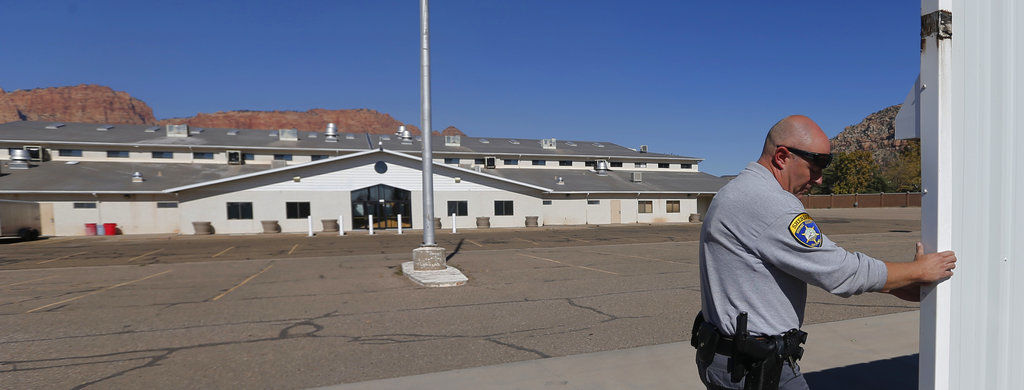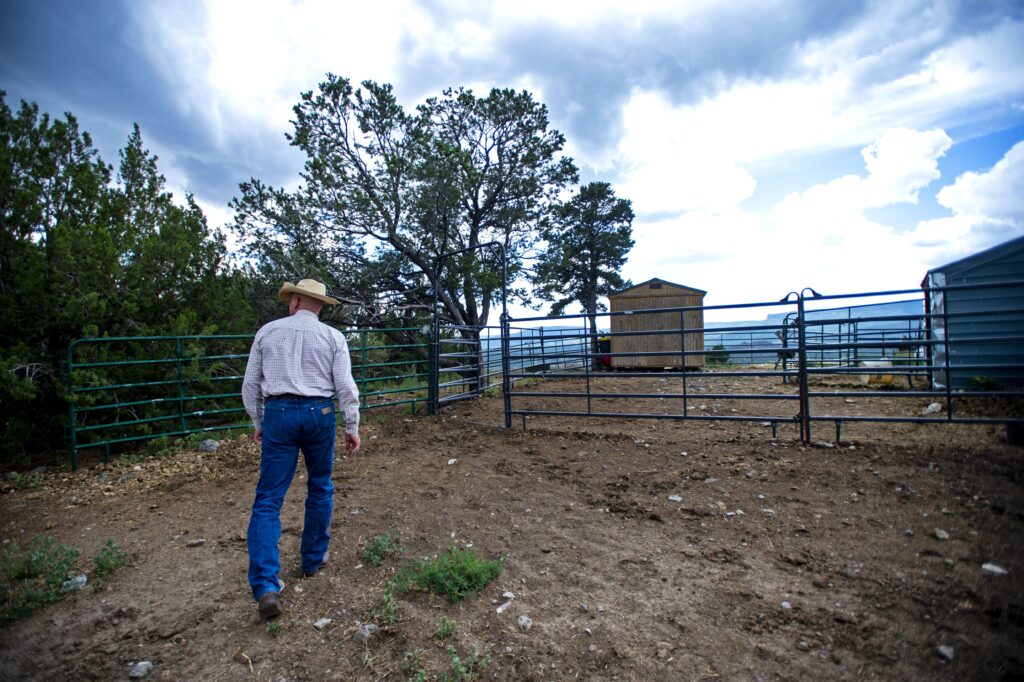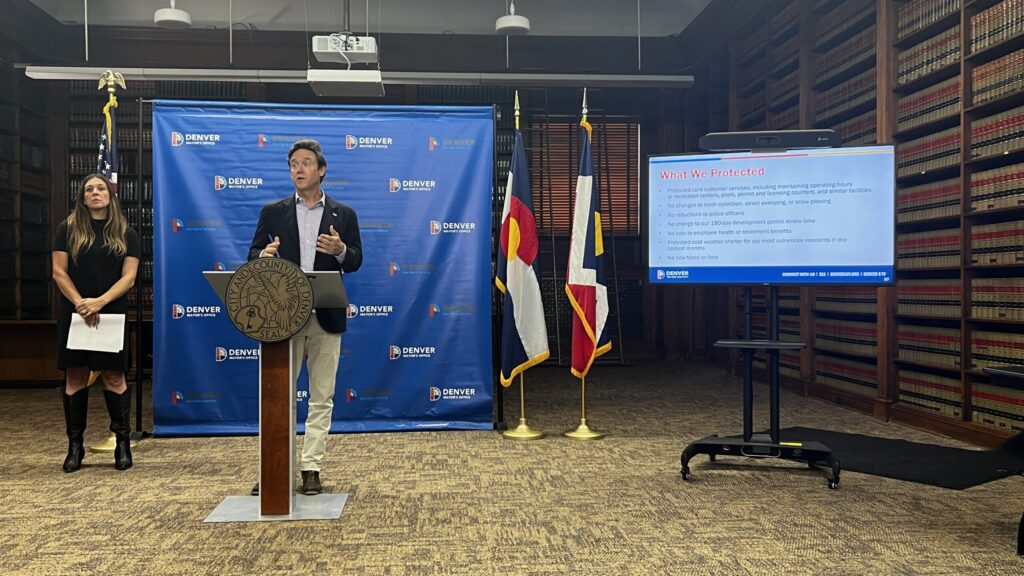OUT WEST ROUNDUP | Polygamous group lets go of sprawling Arizona worship center

ARIZONA
Polygamous group lets go of sprawling worship center
A polygamous group based on the Utah-Arizona border is letting go of the sprawling building where its members worshipped, in the latest sign that the sect run by imprisoned leader Warren Jeffs is crumbling and losing control of the community it ruled for a century.
The group known as the Fundamentalist Church of Jesus Christ of Latter Day Saints, or FLDS, now has nowhere to gather for worship services after the nearly 53,000-square-foot building in Colorado City, Arizona, was taken over recently as part of government-ordered evictions that have taken away about 200 homes and buildings from members who refuse to pay property taxes and $100-a-month occupancy fees.
The FLDS doesn’t have a spokesperson to comment about the development.
The sect is experiencing a major leadership void with Jeffs serving a life sentence for sexually assaulting underage girls he considered brides and his brother Lyle Jeffs serving nearly a five-year sentence for his role in carrying out an elaborate food stamp fraud scheme and for escaping home confinement while awaiting trial.
Members have said they have been worshipping at home on their own. They still consider their leader and prophet to be Warren Jeffs, even though he has been in jail in Utah or Texas continually since 2006.
IDAHO
Men who say they possessed hemp face marijuana charges
BOISE – Two men have been charged with trafficking marijuana into Idaho even though they say they were transporting immature hemp plants from one out-of-state farm to another.
Police in Ada County arrested Andrew D’Addario, of Colorado, and Erich Eisenhart, of Oregon, after an April traffic stop.
Officers observed a truck with the two men inside parked in a parking lot, said prosecutor Jill Longhurst. Officers noticed the smell of marijuana from the truck, and the two men appeared nervous, she said.
When officers searched the truck, they found 915 live marijuana plants, Longhurst said.
But the defense attorney for the two men contends they were hauling immature hemp plants from Colorado to Oregon.
A jury trial is set to begin Jan. 23. If found guilty, they face a mandatory minimum of five years in prison.
Idaho is one of only a few remaining states where industrial hemp is illegal, according to the National Conference of State Legislatures. At least 41 states have passed legislation legalizing the plant, and all states bordering Idaho have legalized hemp.
But a provision of the farm bill that passed Congress on Dec. 12 removes hemp from the list of federally controlled substances and treats the low-THC version of the cannabis plant like any other agricultural crop.
MONTANA
States cite climate worries in push to stop coal sales
BILLINGS, Montana – Four states that say burning coal will hurt their residents as it makes climate change worse are trying to stop the Trump administration from selling vast reserves of the fuel that are beneath public lands.
Attorneys for California, New Mexico, New York and Washington argued before a Montana-based federal judge that the coal sales have been shortchanging taxpayers because of low royalty rates and cause pollution that puts the climate and public health at risk.
The states were joined by conservation groups and Montana’s Northern Cheyenne tribe in a lawsuit that seeks to revive a coal leasing moratorium imposed under President Barack Obama. The moratorium blocked new lease sales from federal lands that hold billions of tons of the fuel.
The Trump administration said in court filings that ending the moratorium last year was of critical importance to the economy. That claim comes despite the slow pace of lease sales in recent years and a precipitous drop in demand for the heavily polluting fuel.
U.S. District Judge Brian Morris, the presiding judge, who was appointed by Obama, recently ruled in a separate case that the administration must consider reducing coal mining in the Powder River Basin of Wyoming and Montana to help combat climate change.
Trump approved the contentious Keystone XL oil sands pipeline from Canada last year, but Morris blocked it temporarily in March. The judge said further environmental reviews were needed for the line to comply with federal laws.
Some of those same laws are at the center of the coal moratorium dispute.
The states and their allies want push to stop further leasing and resume a sweeping review of the program’s environmental effects.
The outcome of the court case could be pivotal to the industry’s long-term outlook and determine if it has access to a cheap and readily available supply of coal.
ARIZONA
Commercial robotaxi service is now picking up passengers
Robot cars are now officially a real business. Waymo, an arm of Google parent Alphabet Inc., has launched a commercial robot ride-hailing service in Arizona called Waymo One.
Like Uber or Lyft, customers will summon a ride with a smartphone app. But in this case, the car will be driving itself.
Only “a few hundred customers” will have access to the app and participate in the early stages, according to Waymo. Although the cars will drive themselves, a Waymo engineer will sit behind the wheel in case anything goes wrong. Waymo did not say when the cars will start arriving without a human minder or when the program will be expanded.
Waymo’s cars, Chrysler Pacifica minivans bristling with autonomous driving technology, are available in several eastern and southeastern Phoenix suburbs, including Chandler, Tempe, Mesa and Gilbert. The fares are similar to those charged by Uber and Lyft.
Waymo One represents the beginnings of a business that could be worth a lot of money. How much, no one yet knows: Wall Street estimates of Waymo’s market value, should it be spun off, range from $50 billion to $175 billion.
Waymo began driverless-car development in 2009. Although dozens of companies, from small startups to major motor vehicle manufacturers, are developing driverless systems, Waymo is considered the emerging industry’s leader.
The Phoenix area was chosen deliberately for its friendliness to driverless cars – and not just because of the support of Arizona’s governor and local officials. (Regulations on driverless cars are less stringent in Arizona than in California.)
The flat, snow-free desert terrain, the well-kept and well-marked roads, the scarcity of trees to block street signs, and sun-blasted sidewalks on which few pedestrians tread all lend themselves to early robot car deployment.
NEW MEXICO
State Supreme Court to hear ‘warrior gene’ appeal
SANTA FE – The New Mexico Supreme Court will review an appeals court ruling in the case of a man convicted of murder who unsuccessfully sought to introduce evidence that he was genetically predisposed to violence.
Anthony Blas Yepez was convicted of beating, choking and burning to death his girlfriend’s 75-year-old step-grandfather, George Ortiz, during a domestic dispute in 2012.
Yepez’s lawyer attempted to introduce evidence at his 2015 trial, seeking to cast doubt on his client’s ability to form the intent required to convict him.
The so-called warrior gene theory has been debated since a Dutch scientist discovered in the early 1990s that all the male relatives in a New Zealand family with a history of aggressive violence lacked a specific gene critical for regulating anger. The theory is that people with low levels of a certain enzyme, who also are abused in childhood, are prone to impulsive violence.
The violence that ended in Ortiz’s death began when Ortiz struck his girlfriend in the face, according to her testimony at Yepez’s trial.
Yepez said he didn’t remember exactly what happened next, only that he “must have blacked out.” When he regained consciousness, he was on top of Ortiz, who was bleeding profusely from the back of his head and appeared to be dead. The couple then poured cooking oil over Ortiz’s body and set it ablaze before fleeing in Ortiz’s car, according to records.
A Santa Fe County jury convicted Yepez of second-degree murder and sentenced him to 22 years in prison after a judge disallowed expert testimony about studies that had shown people who have low levels of an enzyme that breaks down certain neurotransmitters are more likely to be impulsively aggressive.














